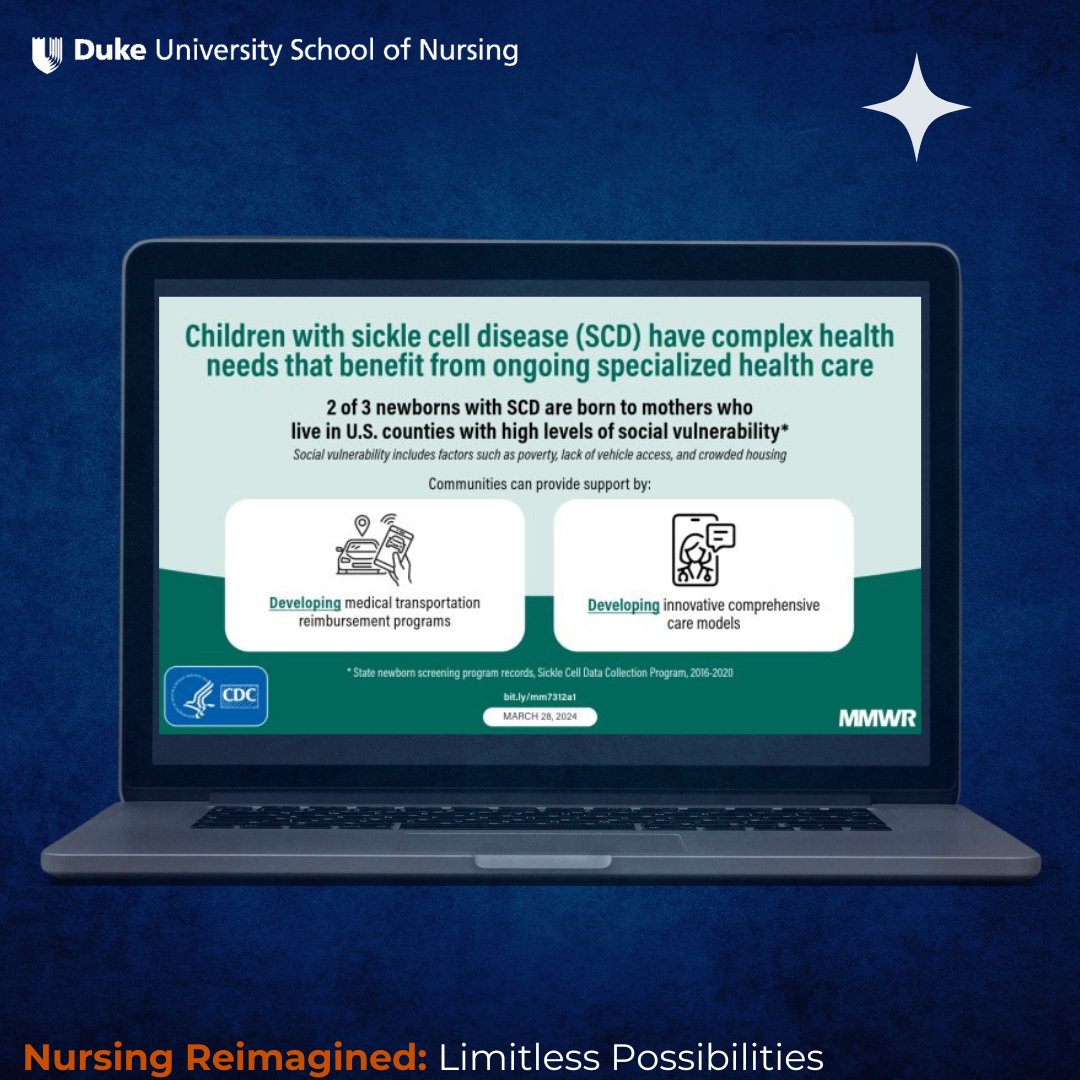Duke University School of Nursing Researchers lead a Multi-State Study on Sickle Cell Disease
The Multi-State Study shows that almost two-thirds of babies born with sickle cell disease live in disadvantaged areas.

In the latest edition of its Morbidity and Mortality Weekly Report (MMWR), the Centers for Disease Control and Prevention (CDC) has published a multi-state study that showed that one in every 350 non-Hispanic Black babies have sickle cell disease (SCD) and almost two-thirds of these babies live in disadvantaged areas.
The study led by Duke University School of Nursing’s (DUSON) Mariam Kayle, PhD and coauthored by DUSON’s Wei Pan, PhD and Carri Polick, PhD, was in collaboration with the Duke University School of Medicine (Audrey Blewer, PhD, MPH, Jennifer Rothman, MD, and John Strouse, MD, PhD), the North Carolina Department of Health and Human Services-Division of Public Health, collaborators from 10 other states, and the CDC.
SCD is an inherited blood disorder with both premature mortality and significant morbidity that primarily affects Black or African American communities in the United States. These high rates of morbidity are compounded by existing health inequities and structural racism, with social determinants of health further contributing to poor outcomes amongst people living with SCD.
In conjunction with updating the birth prevalence rates of SCD, the study examined county-level social factors that may affect health outcomes for infants with SCD. “Our finding that 64% of birth mothers lived in counties with high or very high social vulnerability on housing type and transportation identifies housing and transportation as major social determinant of health issues for infants living with SCD and their families,” says Dr. Kayle. “In order to improve access to care for this population, tailored interventions by local health agencies, including increasing access to transportation, improving housing, and advancing equity in high vulnerability areas are needed” Dr. Kayle explains.
“Health equity was a major objective of this work. Social determinants of health drive 80% of health outcomes. If we want to make a significant impact and improve the lives of historically marginalized populations, we need to focus beyond health care delivery and address the health inequities and social justice issues that impact people’s lives and health.”
Mariam Kayle
PhD, RN, CCNS, FAAN
Of the 3,305 newborns with SCD, 435 were born in North Carolina between 2016 and 2020, making North Carolina second to Georgia in the number of newborns with SCD among the 11 states. Most newborns with SCD in North Carolina had sickle cell anemia (62%), the more severe type of SCD and approximately half lived in five counties (Mecklenburg, Guilford, Durham, Wake, and Cumberland). “For North Carolina, the Southeastern part of the state, specifically Cumberland County, is a high priority area to improve access to care for infants with SCD as it has a relatively high number of newborns with SCD and very limited access to comprehensive sickle cell care” Dr Kayle explains.
Dr. Kayle notes that this study continues DUSON’s commitment to health equity and social justice. “Health equity was a major objective of this work,” she says. “Social determinants of health drive 80% of health outcomes. If we want to make a significant impact and improve the lives of historically marginalized populations, we need to focus beyond health care delivery and address the health inequities and social justice issues that impact people’s lives and health.”
Dr. Kayle is an Associate Professor at the School of Nursing. She is co-principal investigator of the North Carolina Sickle Cell Data Collection program funded by CDC. The study was a collaboration across 11 states who are part of the Sickle Cell Data Collection program funded by CDC.
The full study can be viewed in the March 28 CDC MMWR publication available online here.
The findings and conclusions in this publication are those of the authors and do not necessarily represent the views of the North Carolina Department of Health and Human Services, Division of Public Health. The study was supported by a cooperative agreement from the Centers for Disease Control and Prevention: CDC-RFA-DD20-2003 Sickle Cell Data Collection.

